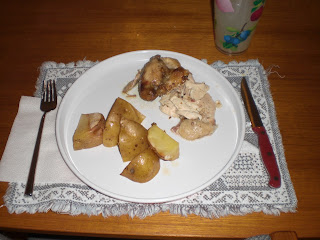It's decidedly spring here and, as such, a young girl's fancy turns to thoughts of Greece. "Ah-ha!" I thought: Roasted chicken with lemon, olive oil, and scads of oregano—simple, fresh-tasting, and delicious. Basically, this is my take on a dish that is often on offer at tavernas called kotopoulo fournou (κοτόπουλο φούρνου), which is served with pan-roasted potatoes and a green salad.
A 5-pound whole organic chicken
2 lemons
10 garlic cloves
1/2 large Spanish onion, sliced
4 tsp. sea salt
4 tbsp. olive oil
Lots of dried oregano
4 Yukon Gold potatoes
1 cup low-sodium chicken broth
Preheat your oven to 350 degrees F.
Cut the 2 lemons into halves. Peel all of the garlic cloves. Keep 5 of the garlic cloves whole and thinly slice the remaining 5 cloves. Slice the onion. Cut the potatoes into eighth-sized wedges. Put everything aside.
Take out a large glass baking dish.
Remove the innards from the chicken's central cavity (you can reserve these for another use or throw them out—your call). Rinse and dry your chicken, then place in the glass baking dish.
Insert your 5 garlics' worth of thin slices right beneath the skin of the chicken, distributing them over the whole chicken. This will give the chicken a mild garlicky flavor all over, but not too strong (Hi, Mom!).
Choose a side of your chicken to begin with and place it face-up in the glass dish. Squeeze one lemon's worth of juice over the chicken, then insert the two used lemon halves into the central cavity. Sprinkle the chicken with 2 tsp. salt. Brush the chicken with 2 tbsp. olive oil, making sure to cover all the skin. Generously sprinkle dried oregano over the oiled-up chicken, giving it a nice coating.
Flip the chicken over and repeat the previous step on the other side.
Insert the remaining 5 garlic cloves and about half of your onion slices into the chicken's cavity, nestling them among the 4 lemon halves.
Place your potatoes around the chicken, trying to distribute them as evenly as possible. Place your remaining onion slices among the potatoes.
Finally pour the chicken broth among the potatoes—some of this liquid will burn off turning cooking, which will help keep the potatoes and the chicken nice and moist. Nobody likes dry chicken.
Before you put the chicken in the oven, it should look something like this:
Roast in oven for 50 minutes, then take out and rearrange the potatoes for even roasting. Return the chicken to the oven for another 50 minutes.
To be completely cooked, the meatiest part of the chicken should reach 180 degrees F. The best way to figure this out is to use a meat thermometer, which are inexpensive and available at most grocery stores and at Amazon .
.
You may have to wait a few moments for the thermometer to equilibrate, but...
We have a winner!
And if you need any more convincing to make this, check out this headline from Tuesday's Wall Street Journal:
Eating like a Greek can apparently lower the risk of developing diabetes, and who doesn't want that?
Warning: Roasting a whole chicken makes a lot of food. Ideas for leftovers? Try a multi-grain wrap of thinly sliced cold chicken breast, baby greens, and tzatziki or chicken salad with pecans and grapes. The potatoes are extremely delicious cold and develop their lemony flavor overnight.
Incidentally, Mark Bittman also has roast chicken on the brain this week.









No comments:
Post a Comment